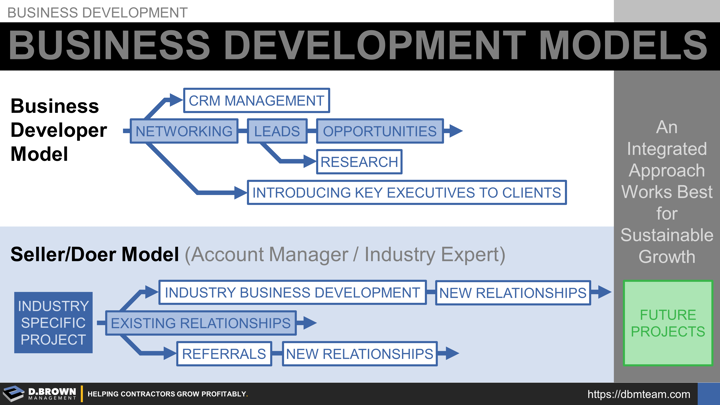The objective of business development is to create new opportunities that will ultimately lead to future projects in alignment with a contractor's strategic market choices.
As contractors grow, these market choices must also evolve along with the model for business development including who is involved. There are numerous people arguing for either the "Seller-Doer" or dedicated "Business Developer" model. Integration of these two models is often the best approach.
All contractors start out as a "Seller-Doer" model. The first thing a contractor must do is find a customer willing to pay them to build something. As the contractor scales through stages 1-3 and the burden of this becomes too great for the owner, the next step usually involves turning estimators and project managers into seller-doers. At first, this is a vague expectation like "Feed Yourself" and may evolve into specific metrics to achieve and a collection of tools that could help.
There will be some absolute standout successes in this model validating the model for scaling, but cracks usually begin to show as a contractor navigates growth between stages 4 and 5, typically including some combination of these:
- There are feast and famine types of cycles at the individual level and company level.
- There is too little emphasis put into pursuing new opportunities due to comfort with existing customers and markets.
- There is a wide range of both volume and profitability between people due to lack of standards and management systems.
- Inconsistent customer experiences.
- Lowered morale and higher stress. Not everyone is wired for both types of activities and without good management systems, overload occurs easily.
The next logical step is a dedicated "Business Developer," which brings its own set of challenges and typically includes:
- The people in the "Seller-Doer" role back off on their activities thinking the "Business Developer" will take care of it all.
- The "Business Developer" tries to do too much from marketing through "Closing" the project due to a combination of both their past experience and unclear expectations.
This is where clarity of the key responsibilities and roles at each stage of the sales funnel is critical.
The Business Developer
- Focus on the sales funnel, primarily networking, lead management, and generating qualified opportunities. Effective business development starts with activity. All other things being equal, the business developer who is logging more "Touches" (calls, meetings, emails, etc.) each week will be more successful in developing opportunities.
- Manage the CRM (Customer Relationship Management) software across the company ensuring everyone stays in sync with the same information.
- Research leads and opportunities.
- Introduce key executives and other team members to clients, potential clients, and influencers.
- Assist in the process of opportunity evaluation, setting the sales strategy, and the proposal stage.
The Seller-Doer
- Leverage their technical expertise and reputation at specific existing customers and within a specific industry sector to generate project opportunities.
- Follow up with referrals from satisfied existing customers to build new relationships, ultimately leading to project opportunities.
- Meaningful and long-term involvement in industry associations or other community groups where reputation and technical expertise will add significant value. This will develop new relationships and lead to project opportunities.
What's important is job role clarity including expectations at different levels with growth. For example, a Project Executive would have very different "Seller-Doer" expectations than a Project Manager. It is also important to define how and when the seller-doer and the dedicated business developer work together.

